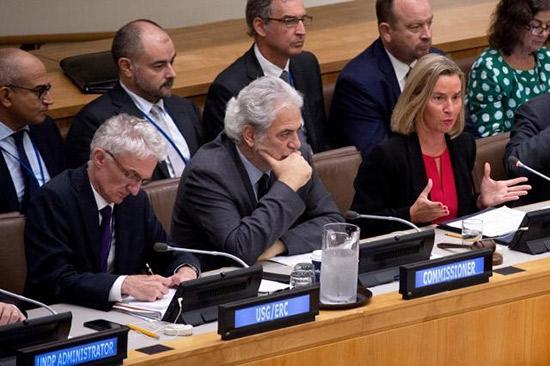
During the 73rd UN General Assembly held last week in New York, the European Union reiterated its call for global efforts towards achieving lasting peace and stability in Syria. The EU continues to act on the ground by EU-funded projects working towards a negotiated political solution based on accountability and inclusivity.
The EU hosted a high-level side event at the 73rd UN General Assembly in New York on 26 September through the Syria Peace Process Support Initiative (SPPI) financed through the Instrument contributing to Stability and Peace (IcSP). The side event was chaired by High Representative of the Union for Foreign Affairs and Security Policy/Vice-President of the Commission (HRVP) Federica Mogherini and European Commissioner for Humanitarian Aid & Crisis Management Christos Stylianides. Attended by Foreign Ministers from around the world, the event aimed to ensure the renewed international commitment to achieving lasting peace and stability in Syria through a political settlement of the Syrian conflict, as well as to address its humanitarian consequences.
Brussels Conference III in March 2019: Garnering support for a political transition in Syria
“Nobody will win neither the war nor the peace without a negotiated political solution”, Federica Mogherini said, setting the tone for Brussels III Conference for the Future of Syria and the region that she announced during the side event. The HRVP stressed the need for a political transition that will allow refugees to return safely.
The Brussels II conference in April 2018 was crucial to raise humanitarian support for the Syrian people and the host communities. “I am proud to tell you that we have already delivered on 95% of the pledges that were made in Brussels last spring" Federica Mogherini said. The Brussels III conference will focus more on the political support the EU can mobilise to accompany negotiations led by the UN.
Engaging with the civil society to build the foundations for peace
Besides the focus on the political support garnered by the EU, Brussels III will also be a Syria Week, featuring Syrian women, youth and civil society. "They are Syria – and the future of Syria must be in their hands, not ours," Federica Mogherini said.
Under the Aswat Faeela (‘Active Voices’) project, the EU empowers young Syrians to together design their own solutions to problems within their communities. Through a capacity-building learning journey, more than 3.000 young Syrians have been equipped to shape the future of their home country to address challenges in the fields of economic recovery, social cohesion and peacebuilding at grass root level as well as with young Lebanese and Jordanians.
Iyad, a 29-year-old Syrian newly-wed who fled to Jordan with his wife in 2013, after violence escalated in Syria, is now a ‘community builder’ in the IcSP-funded Aswat Faeela project: “Young Syrians have great potential; they are the ones who eventually will have to rebuild a country, however, most are currently missing out on opportunities to build social skills and networks, and develop confidence. This is where Aswat Faeela steps in”.
Aswat Faeela has created a network of 21 self-sustaining Syrian youth community groups in Syria, Lebanon, Jordan, Turkey, Denmark, France, Germany and the Netherlands.

Ending impunity key to lasting peace and stability
“Most Syrians don’t want to go back to a country where there is no accountability, and where political detainees are still in jail”, HRVP said during the high-level side event on Syria at the UN General Assembly. There will be no sustainable peace and reconstruction without investigations into war crimes and accountability in Syria.
In keeping with this, the EU has been supporting UN-led efforts to launch the International, Impartial and Independent Mechanism (IIIM) since December 2016. The mechanism aims to collect, consolidate, preserve and analyse evidence of crimes reportedly committed in Syria. Through the €1.5 million committed under its Instrument contributing to Stability and Peace (IcSP), the EU has enabled the start of the IIIM work as of summer 2017. Its support to addressing violations of human rights and international law aims to ensure a meaningful political transition in Syria.
Background
Managed by the European Commission’s Service for Foreign Policy Instruments, the Instrument contributing to Stability and Peace (IcSP) provides short- and mid-term assistance to conflict prevention, crisis-response and peace-building actions around the world. There are currently around 200 projects in over 75 countries. These projects are implemented either by Non-Governmental Organisations, the UN or other International Organisations, EU Member States’ agencies or regional and sub-regional organisations.
The Syria Peace Process Support Initiative (SPPI) is an IcSP-funded project launched in June 2016 by the EU and the German Federal Foreign Office. Its objective is to bring together actors from different sides of the various Syrian dividing lines and to promote women’s role in political and societal developments. The EU also supports the collective support to the International, Impartial and Independent Mechanism implemented by the UN High Commissioner for Human Rights (OHCHR).
For more information
Details
- Publication date
- 2 October 2018
- Author
- Service for Foreign Policy Instruments
